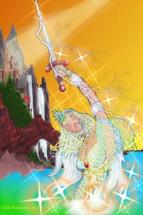
"The Ponce de Leon Project"
by George L. Duncan"Citadel of Cobras" by Aliette de Bodard
"Awakening: A Story of Courage" by David R. Downing
"The Short Bus" by Marsheila Rockwell
"Of Protectors" by C. Michale
"Without Wings" by Kurt Kirchmeier
In "The Ponce de Leon Project" by George L. Duncan, Clint Devlin has been hired to investigate the disappearance of an aide from the senator’s office. His search crosses paths with robotic henchmen, a murdered man, and the possibility of eternal youth. There’s much to be liked in Duncan’s science fiction adventure: an engaging protagonist who actually utilizes his brain more than his gun, a future where robots and machines are used for things other than daily chores, and a mystery slowly unfolding. Unfortunately, the plot was a bit hard to follow, and by midway it begun to putter about, losing itself amongst numerous one-shot characters.
"Citadel of Cobras" by Aliette de Bodard is a fantasy that centers on the mystery of what happened to Masani the hermit after she left the city of Lhira. The tale is told from the point of view of the current sorcerer of Lhira, who just happens to be one of Masani’s failed students. The true focus of the tale is redemption and the sacrifices that must be made in order to attain true enlightenment. The transitions are a bit too choppy to completely ring true. Fully realized characters or leaving more of the background to the imagination would have made for a tighter story.
David R. Downing‘s "Awakening: A Story of Courage" tells the story of a young girl who dreams of slipping down a dark pit only to find herself before a great and terrible beast of the underworld. It is here that she must face her nightmares. Will she find the courage she needs to conquer such a monstrous beast? Some of the writing is iffy, relying on the archaic phrasing that is commonly found in epic fantasy or fairy tales. Here it comes off as stiff and unrealistic. Aside from a moment where the foul beast contradicted itself, Downing’s tale of courage is a short but meaningful entry that isn’t actually overshadowed by its moral.
"The Short Bus" by Marsheila Rockwell examines the question of whether "Special Ed" children are more than what they seem. Are they scientists, musicians, or teachers trapped inside a body with a brain they can’t work with? Artemis Thacker has Down’s Syndrome, but by riding the short bus he begins to see himself as normal. But what does that make everyone else? Rockwell takes what could have easily been a delicate and preachy topic, and turns it into a powerful story about being one’s self. Best story of the issue. Read it.
In C. Michale‘s "Of Protectors," Glynn always dreamed of being a Protector, but a secret she kept from the world could ruin her chances. Her supervisor in the academy, Thaddeus, is constantly bearing down on her, but Glynn is determined to make it to the head of the class, no matter what the consequences. The plot is a standard space opera sort—a mystery slowly unveiled through routine training exercises and meetings with cadets’ superiors. The good ole "have-main-character-look-in-mirror-for-description" artifice rears its ugly head along with numerous unnecessary speech modifiers (i.e. decreed, mused, announced, sighed, and so on). Not recommended.
"Without Wings" by Kurt Kirchmeier is a short piece that tackles the question of what one would do if emotions—especially emotional pain—could be seen as colored auras. Could this gift be used to help those in need? For Lucias, he doesn’t necessarily know all the answers, but he knows he wants to help. It’s his nature, and when he finds himself following a suicide-blue girl home, he begins to understand his gift. Kirchmeier manages to create an interesting idea in a short span of words, and though the ending is given away by the story’s title, there’s a subtle quietness to "Without Wings" that still resonates once it’s over.
(Reviewed by Paul Abbamondi except for "Citadel of Cobras" by Aliette de Bodard which was reviewed by Nicole McClain.)